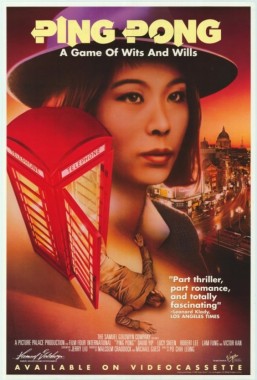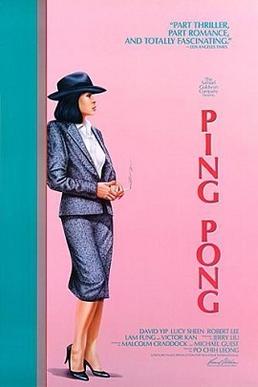 I’ve just re-watched Ping-Pong, the ground-breaking 1986 British film directed by Po-Chih Leong, starring Lucy Sheen and David Yip. I remember watching it as a teenager when it first came out, presumably late on a Thursday evening on Channel 4, which was when all the interesting films were broadcast (My Beautiful Laundrette, Letter to Brezhnev, Mona Lisa). It’s a charming and thought-provoking comedy drama about Elaine Choi (Sheen), a trainee lawyer tasked with executing the will of local businessman Sam Wong, whose body has been found in a telephone box, receiver still in hand. The trouble is, she can’t read Chinese characters. As she tries to uncover not only the linguistic mysteries of the will, but family feuds, an unknown benefactor, and who Sam had made that final, fatal call to, she also uncovers a lot about herself and her own multiple identities. In today’s parlance, we would say that this is a film about intersectionality.
I’ve just re-watched Ping-Pong, the ground-breaking 1986 British film directed by Po-Chih Leong, starring Lucy Sheen and David Yip. I remember watching it as a teenager when it first came out, presumably late on a Thursday evening on Channel 4, which was when all the interesting films were broadcast (My Beautiful Laundrette, Letter to Brezhnev, Mona Lisa). It’s a charming and thought-provoking comedy drama about Elaine Choi (Sheen), a trainee lawyer tasked with executing the will of local businessman Sam Wong, whose body has been found in a telephone box, receiver still in hand. The trouble is, she can’t read Chinese characters. As she tries to uncover not only the linguistic mysteries of the will, but family feuds, an unknown benefactor, and who Sam had made that final, fatal call to, she also uncovers a lot about herself and her own multiple identities. In today’s parlance, we would say that this is a film about intersectionality.
Ping Pong was the first British feature to be filmed in London’s Chinatown with a predominantly British East Asian cast and a female lead. Choi is cool and clever, somehow managing to negotiate a series of resolutions as she is buffered between the different characters, their intergenerational differences, their varying immigrant experiences, and their ideas about what it is to be British Chinese. She also ping-pongs between the communities in Chinatown and the all white legal practice where her older white male boss insists on referring to her as his little China girl… Not that she takes his nonsense.
Recognised as one of the most important British East Asian films (and there aren’t many), the biggest mystery, however, is how, shockingingly, after its initial television broadcast 37 years ago it hasn’t been broadcast again until this month. 
Why on earth do we still see so little British East Asian representation on our screens? Now that I have a multi heritage family of my own, including a British South East Asian daughter who has grown up here and who speaks English as her first language, I begin to understand more deeply how important that question is. “Why, that is truly a sixty-four-million-dollar question – and then some,” Sheen remarks on her website. The film is being re-broadcast for ESEA Heritage Month (East and South East Asian). Sheen continues, “The prospect of more people being able enjoy the work and labour of the creatives behind the camera, to see and hear the voices of the actors, some who are sadly no longer with us; and the wonderful memories, the laughter, the nerves, the overall excitement and buzz of making a film – for me my first. Then there were the hopes and expectations of many riding on my very young and exceedingly green shoulders; much of which until recent years, have never been closed to being realised. A strong principle cast of eight British East and Southeast Asian (BESEA) actors the main protagonist not only a BESEA but a female! The narrative one that was completely ‘British.'”
In Ian Wang’s Little White Lies appraisal of Ping Pong as “the film that revolutionised British Chinese cinema“, he argues that the lack of BESEA representation has nothing to do with lack of talent and plenty to do with British Sinophobia. “The modest success of [British Chinese cinema in] the ’80s, and the drought that followed, belies a simple narrative of racial progress on British screens. The funding and institutional backing which gave Ping Pong a chance was just as easily denied to [later] British Chinese filmmakers.”
Artists and activists such as Sheen are ensuring that BESEA stories are told. It’s time the British Film and Television Industry put its money where its mouth is when it talks about representation.
Ping Pong is currently on Channel 4 catch-up (free with adverts in the UK until the end of this month) and on BFI Player to rent. See my picks from the ESEA Lit Fest Reading List on the YSJ Words Matter blog here.
See my LGBT History Month post on My Beautiful Laundrette here.
My review of the 2019 play of My Beautiful Laundrette is here.
I wrote on the issues in casting in British classical theatre a decade ago here – progress has been made since then, but genuine, sustained and consistent representation of most minority groups is still very much of a problem in British arts.